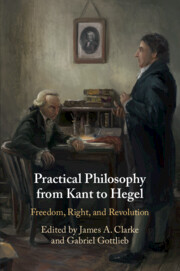Book contents
- Practical Philosophy from Kant to Hegel
- Practical Philosophy from Kant to Hegel
- Copyright page
- Contents
- Contributors
- Acknowledgments
- Abbreviations
- Introduction
- 1 The Original Empty Formalism Objection
- 2 Freedom and Ethical Necessity
- 3 Maimonides and Kant in the Ethical Thought of Salomon Maimon
- 4 Erhard on Right and Morality
- 5 Erhard on Revolutionary Action
- 6 Elise Reimarus on Freedom and Rebellion
- 7 Freedom and Duty
- 8 Fichte’s Ethical Holism
- 9 Jacobi on Revolution and Practical Nihilism
- 10 The Political Implications of Friedrich Schlegel’s Poetic, Republican Discourse
- 11 The Limits of State Action
- 12 Echoes of Revolution
- 13 Public Opinion and Ideology in Hegel’s Philosophy of Right
- Bibliography
- Index
8 - Fichte’s Ethical Holism
Published online by Cambridge University Press: 16 March 2021
- Practical Philosophy from Kant to Hegel
- Practical Philosophy from Kant to Hegel
- Copyright page
- Contents
- Contributors
- Acknowledgments
- Abbreviations
- Introduction
- 1 The Original Empty Formalism Objection
- 2 Freedom and Ethical Necessity
- 3 Maimonides and Kant in the Ethical Thought of Salomon Maimon
- 4 Erhard on Right and Morality
- 5 Erhard on Revolutionary Action
- 6 Elise Reimarus on Freedom and Rebellion
- 7 Freedom and Duty
- 8 Fichte’s Ethical Holism
- 9 Jacobi on Revolution and Practical Nihilism
- 10 The Political Implications of Friedrich Schlegel’s Poetic, Republican Discourse
- 11 The Limits of State Action
- 12 Echoes of Revolution
- 13 Public Opinion and Ideology in Hegel’s Philosophy of Right
- Bibliography
- Index
Summary
My aim in this chapter is to address what looks like a tension in Fichte’s derivation of ethical content for the moral law in his System of Ethics. In the first place, Fichte seeks to derive the content of our duties from our “natural drive [Naturtrieb],” which he defines in terms of our striving for enjoyment. But later in the book we find a second argument that derives the content of our duties from what Fichte calls the conditions of our “I-hood [Ichheit],” namely, our embodiment, intelligence, and sociality. I argue that a careful re-reading of Fichte’s notion of a natural drive is consistent with this second derivation. The key to this reading lies in Fichte’s effort to reframe the natural drive through the category of “reciprocal interaction [Wechselwirkung],” which allows us to view the natural drive as a “formative drive [Bildungstrieb]” that is both active and passive. For Fichte, the formative drive amounts to a striving for self-organization, and this striving, I argue, prefigures what becomes the ethical drive to engage in reciprocal interaction with other members of the rational community.
Keywords
- Type
- Chapter
- Information
- Practical Philosophy from Kant to HegelFreedom, Right, and Revolution, pp. 138 - 156Publisher: Cambridge University PressPrint publication year: 2021

